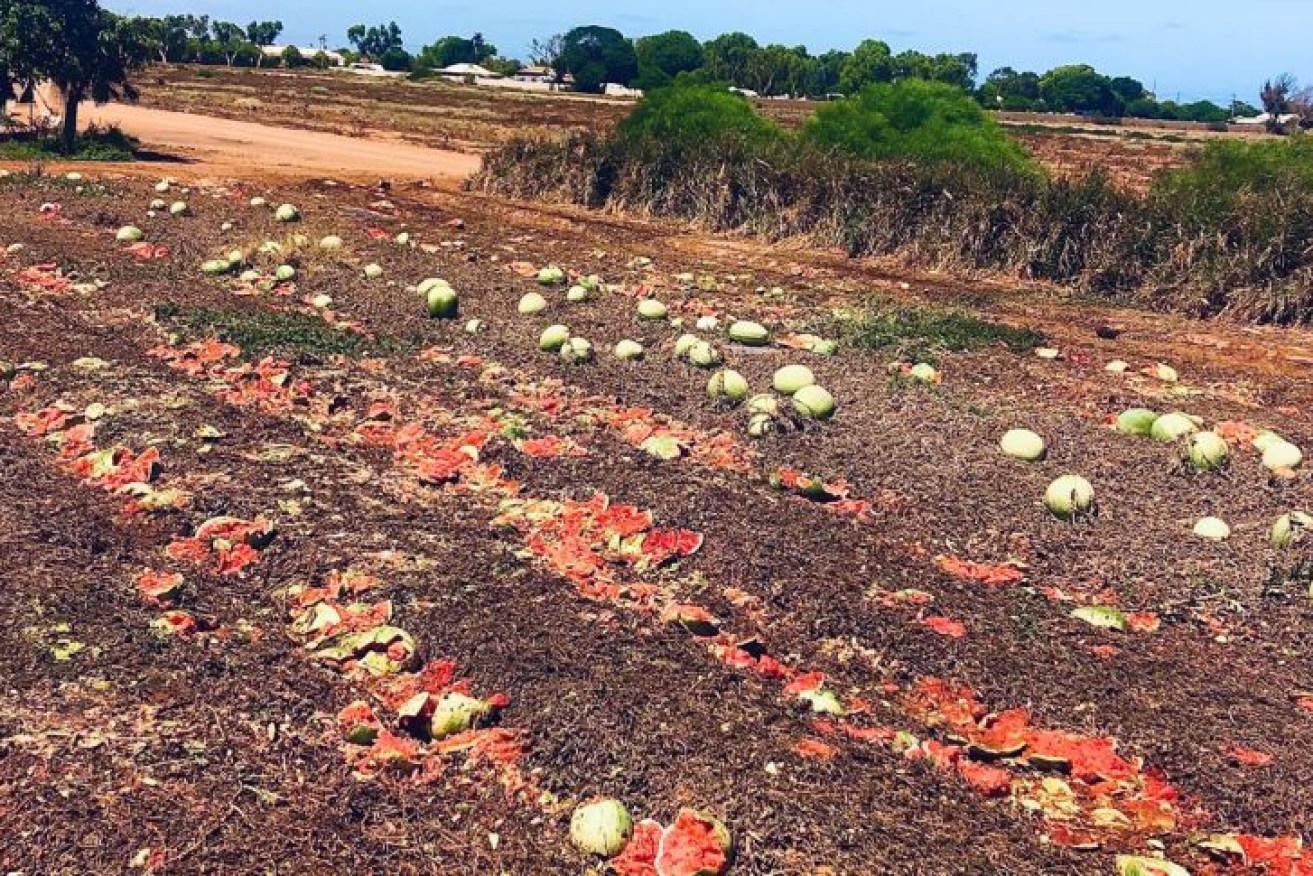National Lost Crop Register surpasses $45 million in losses at farmgate value due to worker shortage

Watermelon grower Tony Vrankovich was forced to slash 100 tonnes of fruit. Photo: ABC News: Tony Vrankovich Photo: ABC
The deterioration of the seasonal workforce is having devastating impacts on the Australian horticultural industry, and with the worse yet to come, it is consumers who will wear the cost.
Last week, the National Lost Crop Register surpassed $45 million in losses at farmgate value.
The most concerning factor is the register has only been open since December last year.
In the last eight weeks there have only been 65 separate crop losses reported, with more than 85,000 agricultural businesses across Australia.
Imported food only accounts for 15 per cent of Australia’s daily food supply, meaning the tightening of supply will likely be felt across major retailers, with supermarket prices tipped to increase.
Watermelons slashed and buried
Watermelon grower Tony Vrankovich has been growing for the past 30 years in the Carnarvon Horticulture District, but after slashing and ploughing in his crop, the demoralisation is too much.
Mr Vrankovich said he would look for another job.
“It’s been pretty hard; we’ve all struggled big time with labour and a lot of us have lost a lot of crop,” he said.

Tony Vrankovich, Carnarvon watermelon grower saw three months work and money “disintegrate” before his eyes. Photo: ABC Rural: James Liveris
At Mr Vrankovich’s plantation, there was one hectare worth of watermelons, with more than 100 tonnes of fruit to be picked.
More than 40 per cent of that went to waste and was ploughed into the ground, costing hundreds of thousands of dollars in loss.
Mr Vrankovich said it was disheartening.
“It is something you’ve looked after for three months, poured a lot of money into it and in the end, you can’t pick it,” he said.
“It seems like it just disintegrates in front of your eyes.”
Due to the climate in the Gascoyne region, Carnarvon can pick up windows in the fruit and vegetable market where other areas are unable to produce, however, Mr Vrankovich said he would not take that opportunity.
“I am not going to plant, I can’t, I can’t take that chance,” he said.
“I am pretty sure there are going to be less workers in the future and I am very sceptical that I’d be able to even plant a crop, let alone pick it.
“Seriously, at the moment I am cleaning up, but then I’m going to go to Perth to try find a job, and if I like it, I will leave the farm.”

Could Australia “end up a nation of imported fruit and veg”? Photo: ABC South West: Zoe Keenan
National crop numbers dwindling
The loss of Mr Vrankovich’s watermelon crop is not a one-off story – every week the horticultural industry bears the brunt of a dried-up workforce.
Richard Shannon is manager of policy and advocacy at Growcom, a peak industry body who represent the National Farmers Federation Horticultural council, he said the worst is yet to come.
“To date, Queensland has recorded losses of up to $33 million, New South Wales $8 million, and Western Australia $2 million,” he said.
“We expect the numbers to be far greater.
“I know personally there are larger growers that have not made reports to the register.”
Mr Shannon said he expected the situation would continue to deteriorate throughout the year.
“Until we get to the point that more people are joining horticulture than leaving, our situation is going to get worse,” he said.
To date, by numerical order, the worst affected crops were strawberries, vegetables (broad), blueberries, and bananas.
Mr Shannon said the shrinking of the national fruit and vegetable crop would have a flow-on effect to what consumers pay.
“Supply and demand is a pretty basic concept in economics, you reduce supply while demand stays the same and the price will go up,” he said.
“It needs to be acknowledged that in normal time, there is a degree of over-production in our industry, so I don’t think it would be the case that crops will be lost and you will see a direct increase in price, there is a bit of margin, but eventually you would have to expect the prices to go up.
“Also, labour is a massive input, if you constrain that, the price has to go up.
“It is going to be an interesting year ahead in terms of what plays out in the grocery aisle and prices.”

Carnarvon Western Australia grower Darryl Hardman, checks his bananas. Photo: ABC Rural: Lucie Bell
Workers? No end in sight
Darryl Hardman is the owner of Desert Sweet Bananas, the biggest banana plantation in Carnarvon.
His packhouse operates every week of the year with much of his produce finding the shelves of the major retailers.
Mr Hardman said the biggest frustration was the lack of workers.
“We’ve been losing fruit trying to keep up,” he said.
“We are losing about 300 cartons a week.
“Obviously, there are no backpackers, the ones that are here have done their 88 days in the field – they are going to leave, so we need another incentive to get people here.
“In the short term, we know there are a lot of workers in the Pacific nations, they are willing, they want to come out, the biggest problem is the cost.”
Mr Hardman said the initial quarantine of one worker cost $4000.
“On-farm quarantining should be option in Western Australia, if other states are allowed,” he said.
“The process of bringing in a worker itself is a minefield, that needs to be streamlined.
“There has got to be places where we can cut these costs down, otherwise we are going to end up a nation of imported fruit and veg.”

Agriculture Minister, Alannah MacTiernan, says there are no miracle solutions available, as long as international borders remain shut due to the pandemic. ABC News: Hugh Sando
State Government not budging
Western Australian Minister for Agriculture Alannah MacTiernan said the Government has done everything in their power to manage the issue.
“We can only take the horse to water, there are no miracles, there is nothing that we can do unilaterally to solve this problem of shortages in international labour,” Minister MacTiernan said.
“We are doing all we can to mobilise a West Australian workforce, subsidising travel, paying for accommodation, and getting workers from Pacific Islands.”
Minister MacTiernan said, realistically, no one was going to open the borders anytime soon to the traditional supply of backpacker labour.
“At this point, we will not consider on-farm quarantine,” Minister MacTiernan said.
“We’ve sought advice from the Chief Medical Officer and the view that we got back to date is that this is a risk for Western Australia.
“We have seen the impact it can have on so many millions of people if a mistake is made in this area.
“It would be completely reckless for us to even consider that.”








